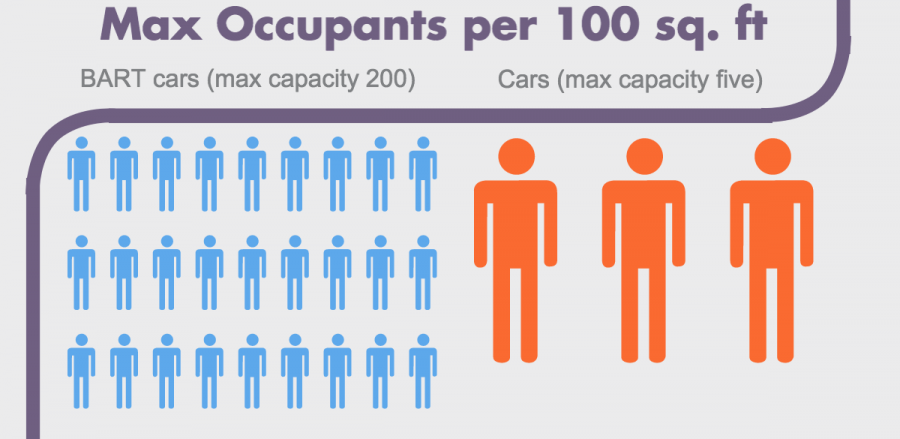Public transit proving more sustainable than personal vehicles
February 3, 2016
People scorn and deride public transit. Viewed as having filthy infrastructure and stigmatized as an option only for the poor, the vast majority of Americans opt to drive cars instead.
Despite these normalized prejudices, public transit poses many unique advantages over cars.
By its very nature, public transit cannot suffer traffic delays. Systems like Bay Area Rapid Transit (BART) and metros run on their own circuits and thus cannot be affected by path congestion. Any delays result from construction and maintenance, all of which is planned for and announced beforehand.
The possibility of injury in a public transit system is also much lower. Services such as BART run on schedules and rarely crash. Furthermore, passengers do not have to fear road rage or intoxicated drivers. In the case of buses, drivers are highly trained professionals far less likely to crash.
Finally, many of the current complaints with public transit could be resolved with greater government funding. Adding BART cars would reduce waiting times. Hiring security guards makes public transportation safer. And simple refurbishments improve cosmetic damages and sterility.
While none of these modifications are free, neither is using automobiles. Car users must take out loans to purchase their vehicle, pay constant upkeep for maintenance and gas and pay off the occasional parking ticket. Considering these “hidden” costs, public transit can be an equitable if not cheaper alternative to cars.
Usage of cars also incurs non-monetary costs. Automobile accidents still rank as fourth highest cause of death in America, and all cars contribute to global warming through emissions. Even electric cars contribute to global warming through the burning of fossil fuels to generate their electricity.
Public transport is imperfect, but we often dismiss it immediately when choosing how to travel. It deserves more consideration as a viable means of transit.
This piece was originally published in the pages of the Winged Post on Jan. 27, 2016.


















![“[Building nerf blasters] became this outlet of creativity for me that hasn't been matched by anything else. The process [of] making a build complete to your desire is such a painstakingly difficult process, but I've had to learn from [the skills needed from] soldering to proper painting. There's so many different options for everything, if you think about it, it exists. The best part is [that] if it doesn't exist, you can build it yourself," Ishaan Parate said.](https://harkeraquila.com/wp-content/uploads/2022/08/DSC_8149-900x604.jpg)




![“When I came into high school, I was ready to be a follower. But DECA was a game changer for me. It helped me overcome my fear of public speaking, and it's played such a major role in who I've become today. To be able to successfully lead a chapter of 150 students, an officer team and be one of the upperclassmen I once really admired is something I'm [really] proud of,” Anvitha Tummala ('21) said.](https://harkeraquila.com/wp-content/uploads/2021/07/Screen-Shot-2021-07-25-at-9.50.05-AM-900x594.png)







![“I think getting up in the morning and having a sense of purpose [is exciting]. I think without a certain amount of drive, life is kind of obsolete and mundane, and I think having that every single day is what makes each day unique and kind of makes life exciting,” Neymika Jain (12) said.](https://harkeraquila.com/wp-content/uploads/2017/06/Screen-Shot-2017-06-03-at-4.54.16-PM.png)








![“My slogan is ‘slow feet, don’t eat, and I’m hungry.’ You need to run fast to get where you are–you aren't going to get those championships if you aren't fast,” Angel Cervantes (12) said. “I want to do well in school on my tests and in track and win championships for my team. I live by that, [and] I can do that anywhere: in the classroom or on the field.”](https://harkeraquila.com/wp-content/uploads/2018/06/DSC5146-900x601.jpg)
![“[Volleyball has] taught me how to fall correctly, and another thing it taught is that you don’t have to be the best at something to be good at it. If you just hit the ball in a smart way, then it still scores points and you’re good at it. You could be a background player and still make a much bigger impact on the team than you would think,” Anya Gert (’20) said.](https://harkeraquila.com/wp-content/uploads/2020/06/AnnaGert_JinTuan_HoHPhotoEdited-600x900.jpeg)

![“I'm not nearly there yet, but [my confidence has] definitely been getting better since I was pretty shy and timid coming into Harker my freshman year. I know that there's a lot of people that are really confident in what they do, and I really admire them. Everyone's so driven and that has really pushed me to kind of try to find my own place in high school and be more confident,” Alyssa Huang (’20) said.](https://harkeraquila.com/wp-content/uploads/2020/06/AlyssaHuang_EmilyChen_HoHPhoto-900x749.jpeg)






